Construction
How Integrated BOQ Software Bridges the Gap Between Construction Departments
July 18, 2025 • 157 Views • 21 min read
Tetiana Stoyko
CTO & Co-Founder
Efficient and transparent financial management is one of the most essential and critical aspects of any business. Modern software offers countless solutions and services for enhanced accounting, budget management, construction cost planning, and other aspects related to financial management.
However, apart from purely covering financial processes, it is important to ensure accessibility and data sharing with the other departments and teams, allowing other employees to track changes and simply stay aware of the current financial state.
One of the most essential such financial documents in the construction field is the Bill of Quantities. BOQ for construction contains essential information and is used for listing all items, materials, labor, and services required to complete a project. This makes BOQs the backbone of many finance-related operations such as cost estimation, budgeting, tendering, and project management.
The Real-World Challenges of BOQ Management
Some may say that most modern approaches to BOQ creation are time-tested and have proven their efficiency. The same applies to traditional BOQ management: most construction companies still use spreadsheets for creating and adjusting the bill of quantities for their projects.
However, what if we told you that there are new ways to create BOQ for construction, making it more efficient, accurate, and integrated into other management systems, used by your construction business daily?
Still, before discussing the advantages of software-based construction budget management software, such as integrated BOQ, or other important services, we have to explain why keeping the status quo is not a great idea.
Spreadsheets Market Dominance
As we said before, the undeniable trend in BOQ estimation software creation is the dominance of preferring to use spreadsheets for quantity management and tracking. The reason for such popularity is obvious: these solutions are familiar, having been studied and used for decades.
Besides, spreadsheets are accessible, being offered by multiple companies such as Microsoft and Google for free or a fairly small fee. It can be a valid advantage of such solutions, especially for small construction companies or projects with limited budgets.
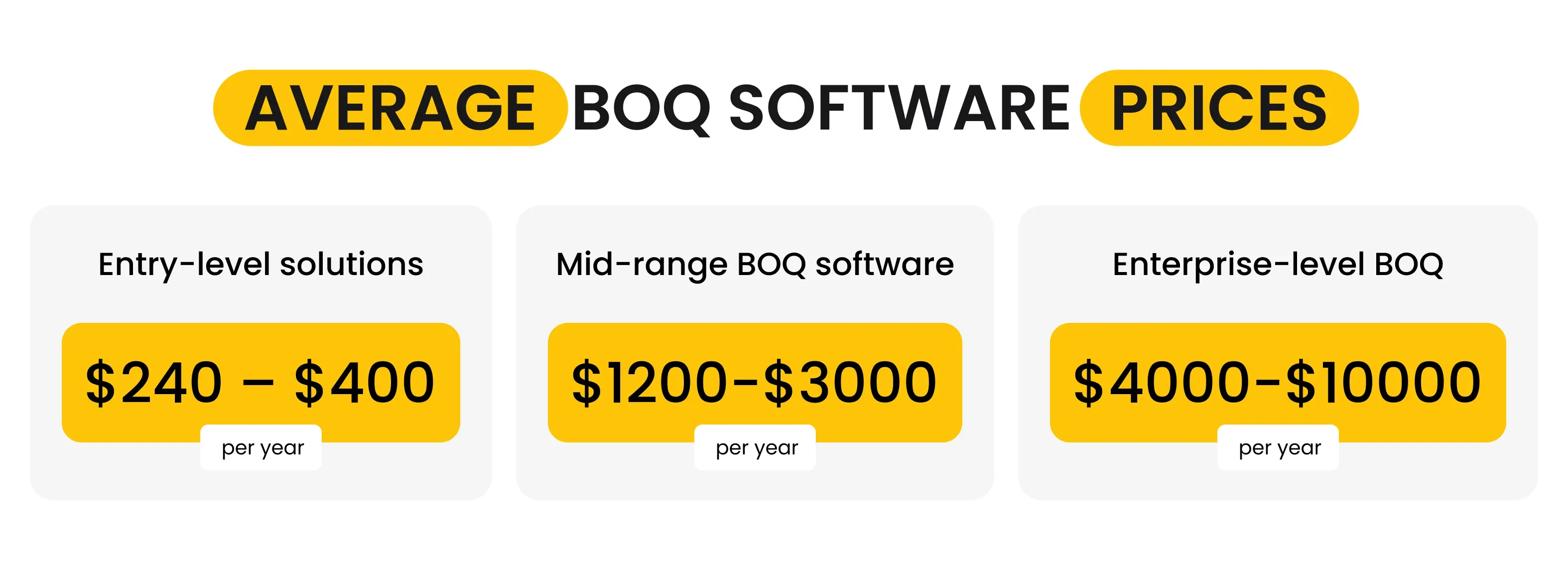
For example, prices for ready-made BOQ estimation software can vary, starting at $240-$400/year for entry-level solutions (Bluebeam Revu Basics) and scaling up to $1,200-$3,000/year for mid-range BOQ software (Autodesk Takeoff), or even $4,000-$10,000+ annually for high-end and enterprise-level BOQ software for construction (Sage Estimating, Procore Estimating). So, why should you pay for such solutions if spreadsheets are free?
Finally, a spreadsheet-based bill of quantities is relatively flexible: Excel offers free templates and allows for customization, making it easier and more intuitive to adapt BOQ to your business needs or project specifics. Additionally, ready-made BOQ estimation software may require some time to adapt due to differences in UI/UX design practices and variable functionality.
Still, despite the apparent superiority of spreadsheet-based bills of quantity, you shouldn’t forget about the drawbacks and imperfections of such solutions.
Drawbacks of Spreadsheet-Based BOQs
Judging from our experience, the primary reason companies prefer using spreadsheets is that they are accustomed to such solutions, rather than the previously mentioned benefits.
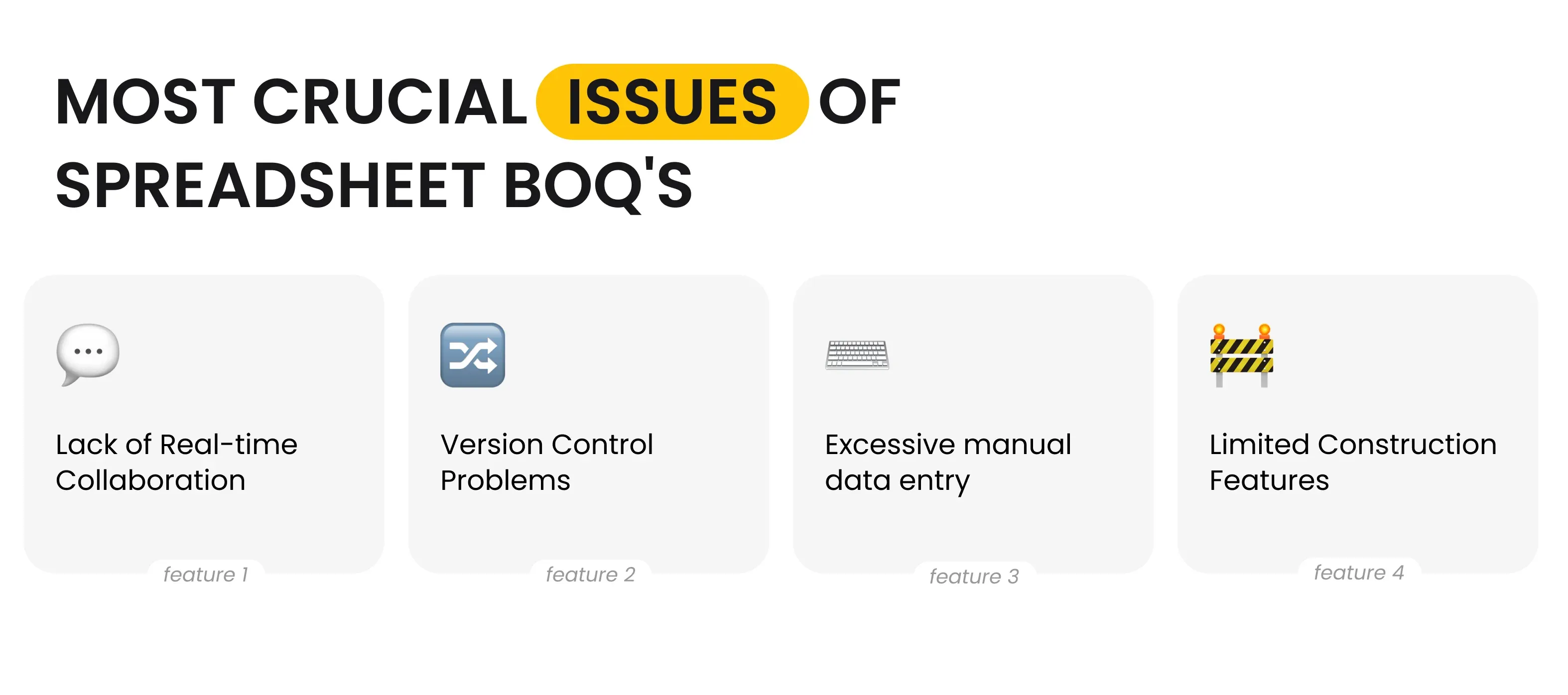
Construction specialists often lack software expertise, which is understandable, as they are experts in their respective industries. Still, this can cause challenges in adopting innovations and scaling software for construction budgeting or other important operations. In its turn, such resistance to applying IT services for construction causes more complex and long-term issues.
Aside from that, the lack of software awareness makes it harder for the construction team to identify and recognize the obvious pitfalls of more traditional business practices.
Long story short, construction budget management software, based on spreadsheets and similar outdated solutions, has many crucial problems, including:
- Preparation Challenges
- Flexibility Limitations
- Project Suitability Issues
- Risk and Cost Implications
- Error Susceptibility
- Scalability Issues
- Lack of Real-time Collaboration
- Version Control Problems
- Manual Data Entry
- Limited Construction-Specific Features
Preparation Challenges
Regardless of whether you decide to create your BOQ in spreadsheets or specialized software, such document preparation is a complex task that requires a significant amount of time and expertise. The larger the project you work on, the harder it is to create an accurate bill of quantities.
Still, some BOQ estimation software can speed up the process by assisting your specialist, making suggestions, and providing custom templates that simplify certain aspects of BOQ preparation.
Flexibility Limitations
One of the most significant issues with spreadsheet-based BOQs is the limited flexibility and difficulty in updating ongoing projects. Even the smallest changes in the bill of quantities for undergoing construction project can affect the overall accuracy, leading to a complete revision of the whole document.
Project Scalability Issues
BOQ doesn’t fit all projects. Smaller teams or projects with undefined scopes may struggle with the lack of BOQ cost efficiency. Spreadsheet-based bill of quantities is a more efficient tool for conventional procurement systems rather than complex or innovative project delivery methods.
Moreover, most popular spreadsheet solutions, such as Excel, struggle with large datasets and complex projects involving multiple variables. So, if your construction project will scale, such BOQs can become slow and prone to crashes.
Lack of Real-time Collaboration
Spreadsheets are a tough solution for real-time collaboration. For instance, Excel doesn't support real-time updates and collaboration because it is primarily an offline application. So, data becomes static and outdated the moment it's entered, hindering decision-making.
On the other hand, Google Sheets is a cloud-based solution that allows for online document updates and subsequent updates. Yet, this causes version control problems.
Version Control Problems
Multiple users working on Excel, Google Sheets, or other spreadsheet files can create version control issues and confusion, especially across teams and departments. This requires additional tracking practices, such as monitoring and approving changes, as well as enhanced quality assurance to prevent mistakes.
Moreover, even though most construction management platforms support spreadsheet integrations and can display them in-app, they are mostly shared as files, making it harder to monitor changes or updates in real-time.
Manual Data Entry
Managing spreadsheet-based BOQ requires significant manual input, which is time-consuming and increases the risk of human error. Once again, such tools lack built-in tools for fixing or preventing errors, forcing your specialists to work on additional tasks, such as regular quality assurance and BOQ revisions.
This also becomes a crucial issue when sharing the BOQ with other employees or departments. Depending on the chosen spreadsheet software, manual operations may require extra steps or manual updates across other platforms, such as your construction management system or other software products used for team management and collaboration.
Limited Construction-Specific Features
Finally, even though these tools offer templates or other customizable settings, they lack domain-specific features needed for construction projects. They can’t handle construction-specific workflows, such as change orders, progress tracking, or integration with project management systems.
What to Look for in BOQ Integration Software?
What should you consider when selecting software for a bill of quantities in building construction?
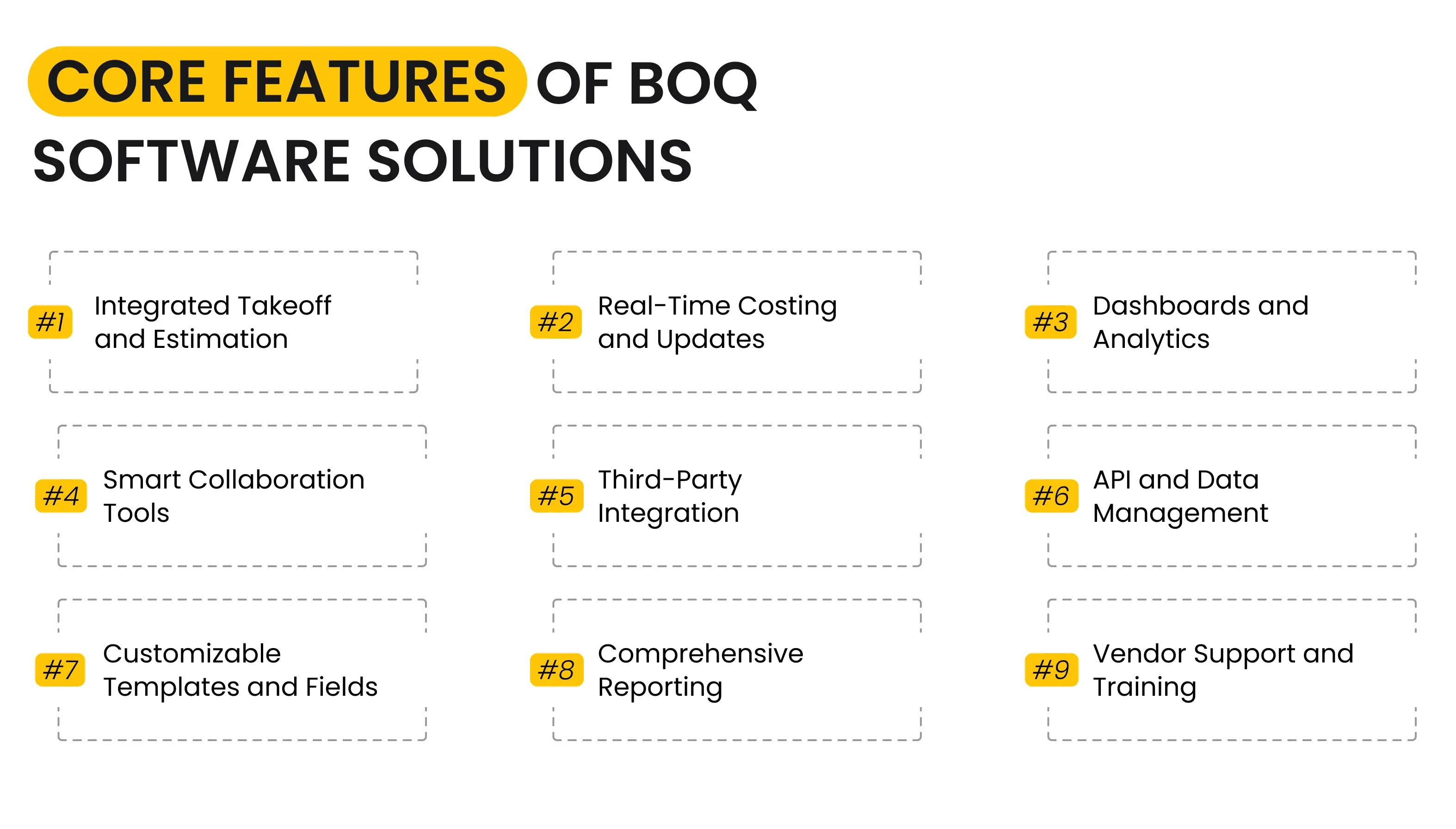
Long story short, here is the list of the most important aspects required for efficient and accurate BOQ creation and management:
- Integrated Takeoff and Estimation: The BOQ for construction should allow you to perform quantity takeoff and generate estimates within the same platform, ensuring a seamless workflow between measurement and costing.
- Real-Time Costing and Updates: Look for automatic updates of BOQ costs as quantities or specifications change. This feature reduces errors and ensures your estimates remain accurate and up-to-date.
- Dashboards and Analytics: Visualization helps monitor project status, compare estimated vs. actual costs, and support data-driven decision-making.
- Collaboration Tools: Multi-user access and real-time collaboration are essential, enabling teams across departments or locations to work together efficiently on the same BOQ.
- Third-Party Integration: The bill of quantities should seamlessly integrate with your existing ERP, accounting, procurement, and project management systems, ensuring data flows smoothly and eliminating duplicate entries.
- API and Data Management: Robust APIs and support for importing/exporting data in standard formats (CSV, Excel, PDF, and BIM models) are crucial for facilitating interoperability with other tools.
- Customizable Templates and Fields: The ability to tailor BOQ templates, item categories, and reporting formats to your organization's needs is vital for flexibility. Comprehensive Reporting: The BOQ software should offer detailed, customizable reports for cost analysis, progress tracking, and budget forecasting.
- Vendor Support and Training: Reliable customer support, training resources, and regular software updates are essential for smooth implementation and ongoing use.
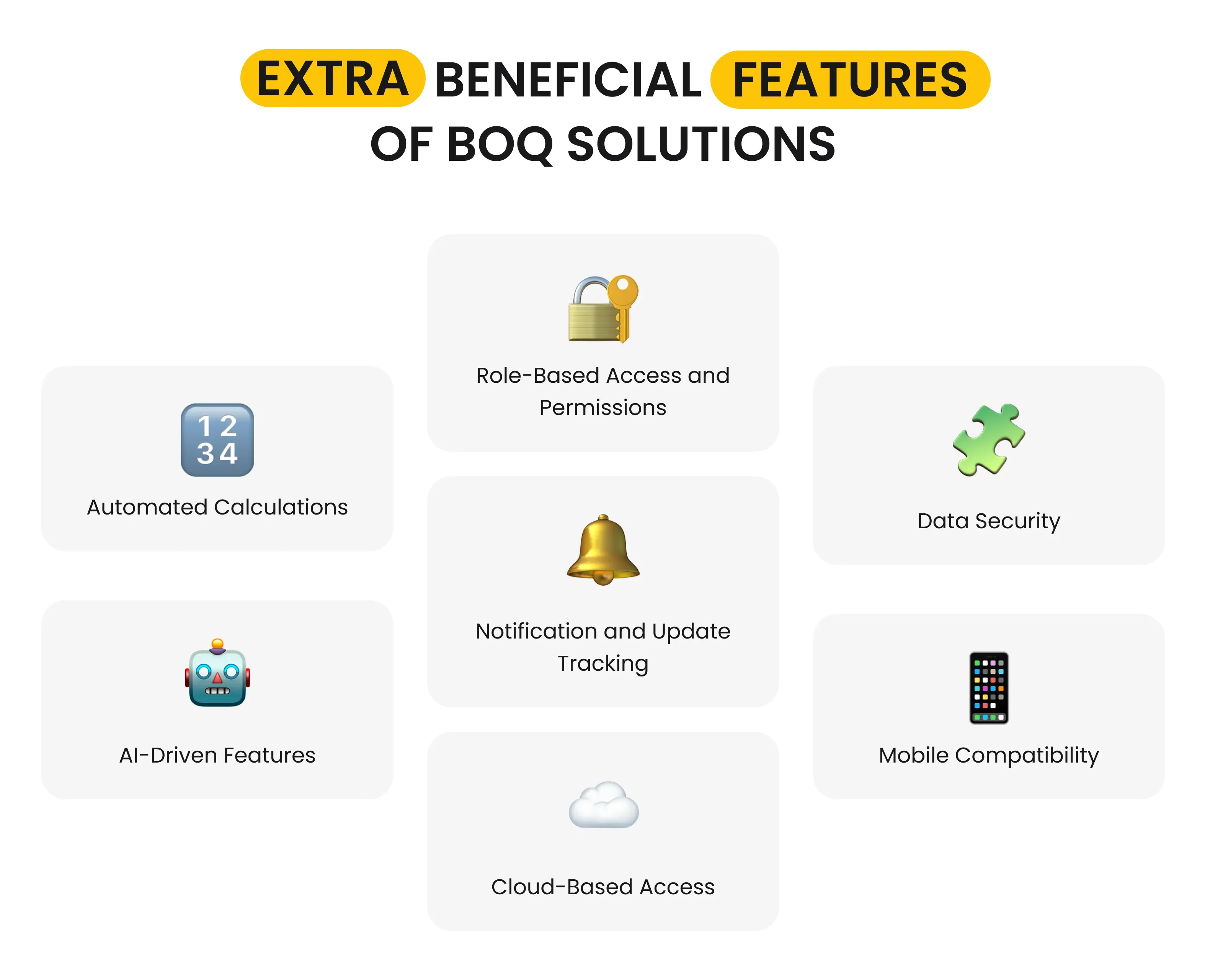
The foregoing features are must-haves and should always be present in modern BOQ software solutions. However, apart from that, you can also pay attention to other optional, yet valuable services like:
- Automated Calculations: Features that automate calculations for materials, labor, and overheads help prevent manual errors and speed up the estimation process.
- AI-Driven Features: Some modern solutions use artificial intelligence to recognize relevant items in incoming BOQs, suggest matching products, and learn from previous projects to improve accuracy and speed.
- Role-Based Access and Permissions: Role-based access helps ensure security, allowing only authorized users to view or edit sensitive data.
- Notification and Update Tracking: They keep all stakeholders informed of updates and revisions, thereby reducing miscommunication and ensuring awareness of recent changes.
- Cloud-Based Access: Cloud solutions enable remote access, real-time updates, and easier collaboration across locations.
- Mobile Compatibility: Mobile access can be valuable for teams working on-site or needing to update BOQs in the field.
- Data Security: Encrypted storage, secure cloud infrastructure, and regular backups help to protect sensitive project data.
Still, these advices are valuable only for cases when you are only considering BOQ for construction and need guidance on how to choose a construction management software, i.e., in the early stages of future project planning. But what should you do if you have already created a BOQ and used spreadsheets as a core software for such purposes?
Fortunately, you still have a chance to fix at least the most common issues and improve your bill of quantities to achieve higher accuracy and efficiency.
What to Do If You Already Have a Spreadsheet-Based BOQ?
Frankly, even a spreadsheet-driven bill of quantities can be improved and offer similar features as industry-specific software-as-a-service solutions for BOQ and budget planning.
Still, achieving such results requires considerable effort, software expertise, and familiarity with the chosen solution (e.g., Excel, Google Sheets). First of all, most spreadsheet specialists are aware of the supported formulas and regularly use them for partial automation.
Such sheets are often supported by various ecosystems, such as Microsoft’s Office 365 or Google Cloud and Workspace. With a proper approach, it is possible to use the full potential of such systems to create a comprehensive, flexible, and highly efficient BOQ that also supports real-time updates and collaboration.
Additionally, most spreadsheets also support code-based scripts. They are more complex and specific than Excel formulas, yet offer significantly more functionality and features, including data import/export from other sources, real-time data updates, enhanced access management, and improved collaboration.
For instance, JavaScript can transform traditional spreadsheet-based BOQ systems into powerful, intelligent applications that address the core challenges of construction cost estimation. By using modern web technologies, real-time collaboration features, and advanced calculation engines, JavaScript helps construction professionals create more accurate, efficient, and collaborative BOQ workflows.
The combination of Office.js integration for Excel enhancement, real-time collaboration capabilities, advanced formula engines, and comprehensive API integration creates a compelling platform for modern construction cost management. Organizations can implement these enhancements gradually, starting with simple Excel add-ins and evolving toward comprehensive web-based solutions that revolutionize their BOQ processes.
For a better illustration, let’s consider one of our latest case studies.
How Integration Replaced Spreadsheets and Prevented Cost Overruns
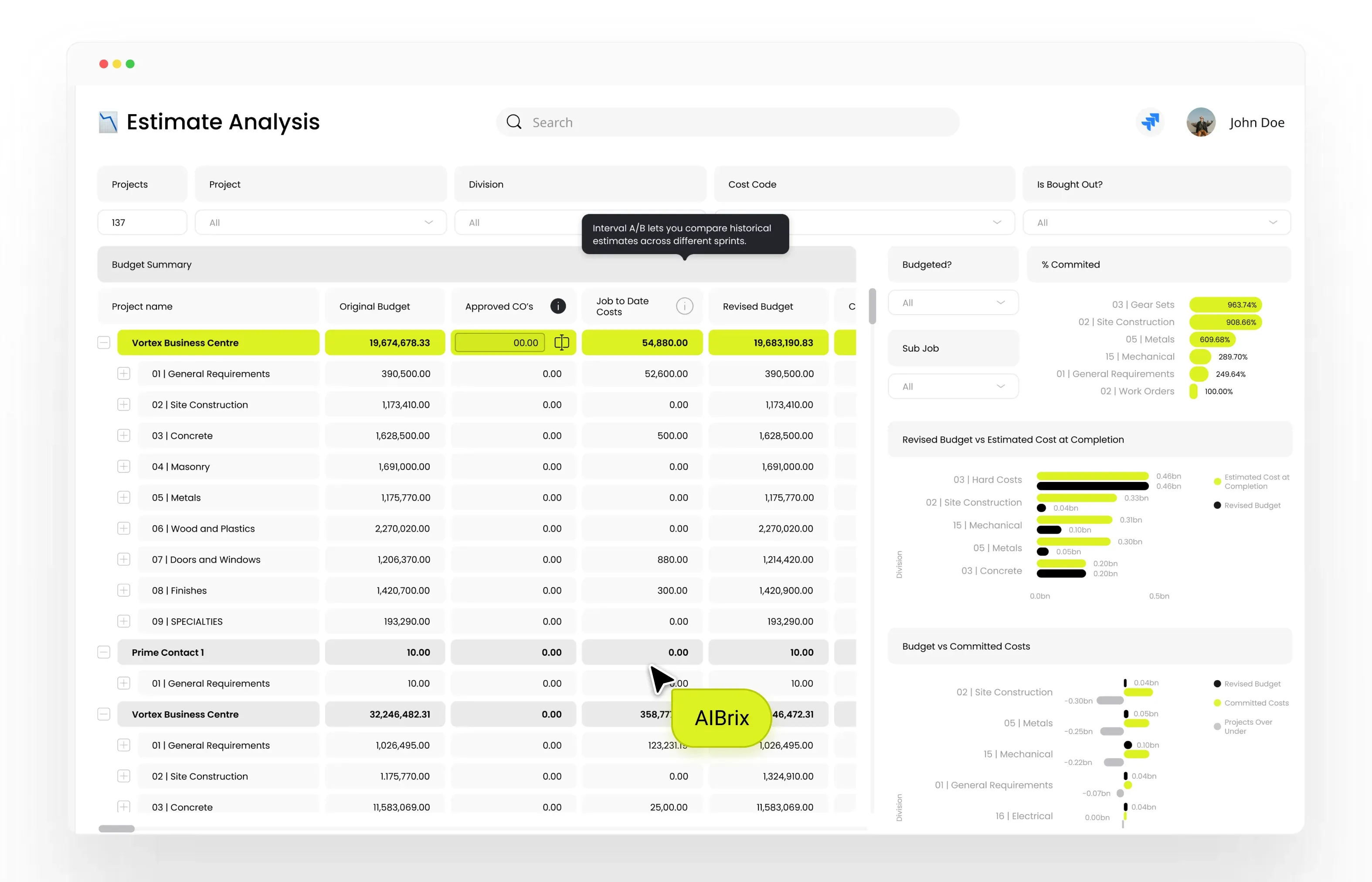
In terms of our recent collaborations, we helped clients to successfully migrate from outdated spreadsheets to a full-fledged, standalone construction management system with an advanced built-in BOQ.
When they contacted us, our clients already had an ongoing project with a created bill of quantities. Yet, they faced a lot of operational and efficiency issues, as well as poor BOQ management. To shorten the time-to-value, we offered a multistep approach:
- Part of our dedicated development team took charge of optimizing and improving spreadsheets, implementing fast and efficient solutions and features to enhance the overall accuracy and usability of existing spreadsheets. Additionally, they planned the further migration steps.
- The rest of the team was responsible for designing, prototyping, and developing an integrated BOQ solution capable of working within a centralized construction management platform.
As a result, in a few months, we optimized the existing Excel-based bill of quantity and some other spreadsheet-dependent operations to boost the business accuracy and performance, achieving a surprising 20% operational efficiency boost and preventing cost overruns by 35% thanks to an accurate and manageable BOQ solution.
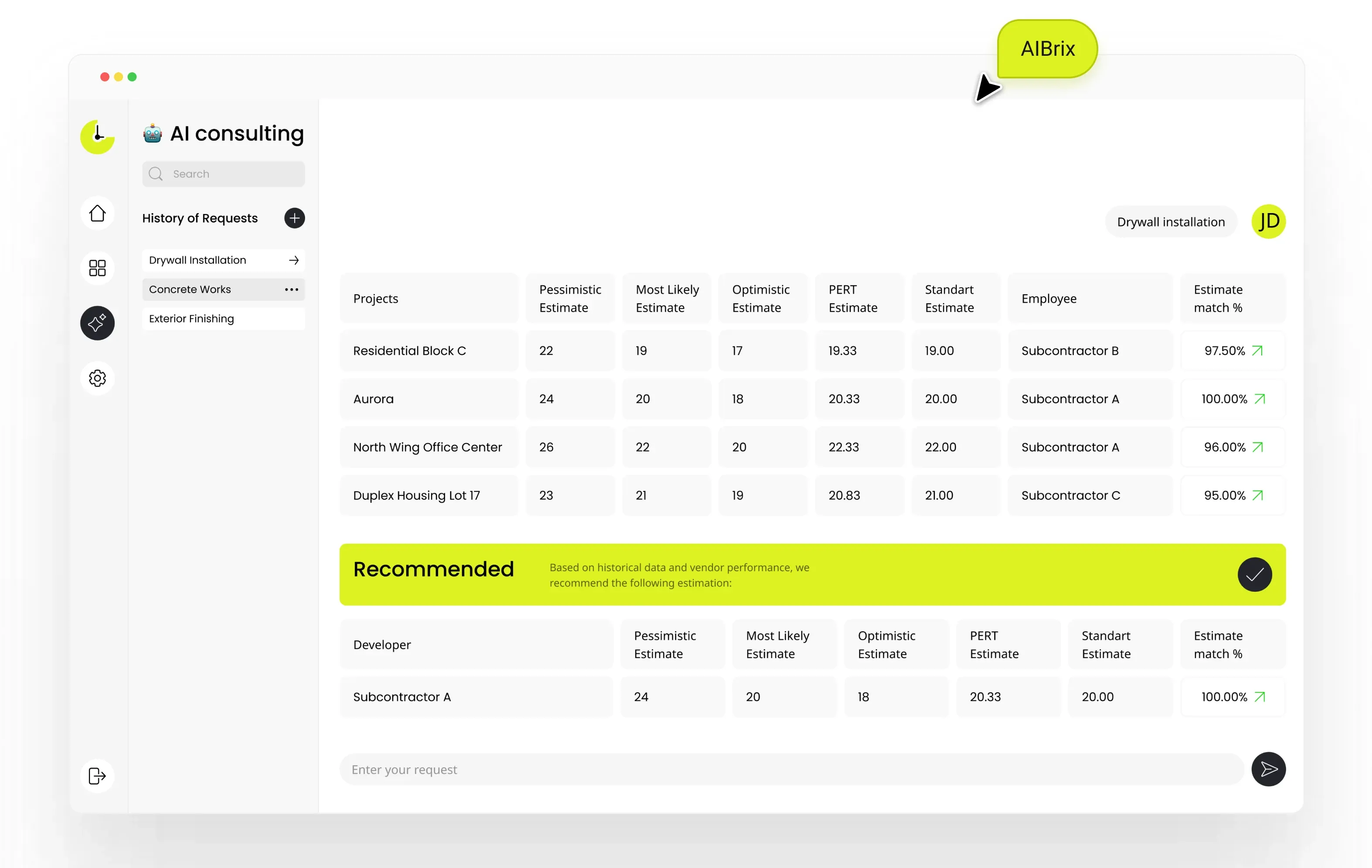
After implementing all required changes and creating a migration roadmap, all developers were involved in the main software development project. At the end of the project, we provided our clients with a comprehensive construction management platform with multiple valuable features that meet business needs and expectations.
For instance, apart from integrating the bill of quantities, which is accessible to all departments (in a mostly read-only format), we also connected it to the dashboard for more convenient data visualization.
Thanks to this cooperation, our client achieved significantly improved cost management and estimation accuracy, as well as enhanced cross-departmental collaboration. Thanks to accessible and user-friendly BOQ integration, multiple specialists have the tools to stay informed about all significant changes.
At the same time, its integration helped ensure seamless data updates, keeping all departments on the same page and eliminating version control issues and other problems caused by outdated information.
What’s your impression after reading this?
Love it!
16
Valuable
10
Exciting
5
Unsatisfied
1
FAQ
Let us address your doubts and clarify key points from the article for better understanding.
Can we migrate our existing BoQ data into the new system?
Yes, existing BoQ (Bill of Quantities) data can be migrated into the new system using data import tools or custom integration, ensuring a smooth transition without losing critical project information.
Can the BoQ software integrate with our existing project management systems?
Yes, BoQ software can integrate with existing project management systems through APIs or custom connectors, enabling seamless data flow and improved coordination between budgeting and project execution.
Is BOQ software expensive to implement?
BOQ software implementation costs can vary, but many solutions offer scalable pricing. While initial setup may require investment, it often leads to long-term savings through improved accuracy, efficiency, and reduced rework.
Does BOQ software support real-time collaboration?
Yes, most modern BoQ software supports real-time collaboration, allowing multiple team members to access, update, and review data simultaneously for better coordination and faster decision-making.
YOU MAY ALSO LIKE
Management Systems
Construction Project Management Software for Small Business: Complete Guide
Construction,
Real Estate
How Construction Workflow Management Software Helps to Reduce Costs and Boost Efficiency?
Construction
How to Deal With Weaknesses of Construction Financial Management Software?
Management Systems
Simple Construction Software for Construction Planning: Case Study
Real Estate
How to Select the Right Construction Management Software for Your Business
Real Estate
Clutch: Incora Is Among the TOP 10 Best Real Estate Software Development Companies Worldwide!
Must-Have Features for Successful Real Estate Mobile App Development in 2024
Let’s talk!
This site uses cookies to improve your user experience. Read our Privacy Policy
Accept
Share this article